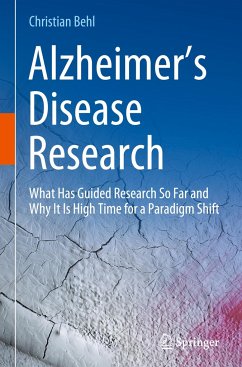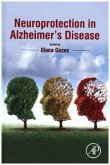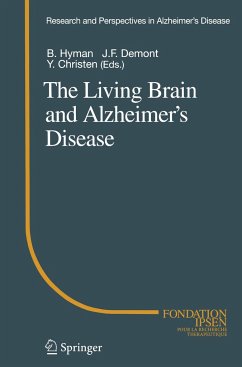This book highlights the key phases and central findings of Alzheimer's Disease research since the introduction of the label 'Alzheimer's Disease' in 1910. The author, Christian Behl, puts dementia research in the context of the respective zeitgeist and summarizes the paths that have led to the currently available Alzheimer's drugs. As the reader is taken through the major developments in Alzheimer's Disease research, particularly over the past thirty years, Behl poses critical questions: Why are the exact causes of Alzheimer's Disease still in the dark, despite all the immense, worldwide research efforts in academia as well as in the pharmaceutical industry? Why has the majority of an entire research field kept focusing on a single hypothesis that establishes the deposition of the amyloid beta peptide in the brain as the key trigger of Alzheimer's pathology, even though this concept has still not been convincingly proven in the clinics? Are there other hypotheses that might explainthe pathogenesis of this complex brain disease, and if so, why were these perspectives not adequately followed?
In this book, Behl tries to answer these questions. Starting with the historical background, the author illustrates the long and arduous research journey, its numerous setbacks, and the many alternative explanations for the disease, which have started gaining increasing attention and acceptance in the Alzheimer's research community only more recently.
With his deep dive into the history and progression of this research, including the most recent developments, Behl explains why he believes that it is high time to promote a paradigm shift in Alzheimer's Disease research.
The book is written for all researchers in the fields of neurobiology and neurodegeneration, as well as other biomedical fields, who would like to gain a broad and beyond the surface insight into (the key developments of) one of the most promoted research fields of our time. With its extensive literature references and over 100 illustrations, the book is also attractive for students and interested lay persons. Elaborating on all the different aspects and research approaches of this research field, the author aims to convince the reader that the underlying causes of Alzheimer's Disease may be much more complex than previously thought and that this must be considered for future research directions. While he hopes that the Alzheimer's research community is finally ready to shed its 'amyloid-straitjacket' that has hampered progress for too long, he is also convinced that a much-needed paradigm shift can guide future Alzheimer's Disease research and provide a new and broader perspective on this age-dependent brain disease.
In this book, Behl tries to answer these questions. Starting with the historical background, the author illustrates the long and arduous research journey, its numerous setbacks, and the many alternative explanations for the disease, which have started gaining increasing attention and acceptance in the Alzheimer's research community only more recently.
With his deep dive into the history and progression of this research, including the most recent developments, Behl explains why he believes that it is high time to promote a paradigm shift in Alzheimer's Disease research.
The book is written for all researchers in the fields of neurobiology and neurodegeneration, as well as other biomedical fields, who would like to gain a broad and beyond the surface insight into (the key developments of) one of the most promoted research fields of our time. With its extensive literature references and over 100 illustrations, the book is also attractive for students and interested lay persons. Elaborating on all the different aspects and research approaches of this research field, the author aims to convince the reader that the underlying causes of Alzheimer's Disease may be much more complex than previously thought and that this must be considered for future research directions. While he hopes that the Alzheimer's research community is finally ready to shed its 'amyloid-straitjacket' that has hampered progress for too long, he is also convinced that a much-needed paradigm shift can guide future Alzheimer's Disease research and provide a new and broader perspective on this age-dependent brain disease.
"This book ... represents a tour de force of almost 700 pages written by a leading contributor to the field over the last three decades, Christian Behl. ... The text is extremely thoroughly referenced, and the author describes his literature research process in detail." (Anthony J. Turner, Journal of Neurochemistry, October 14, 2023)








